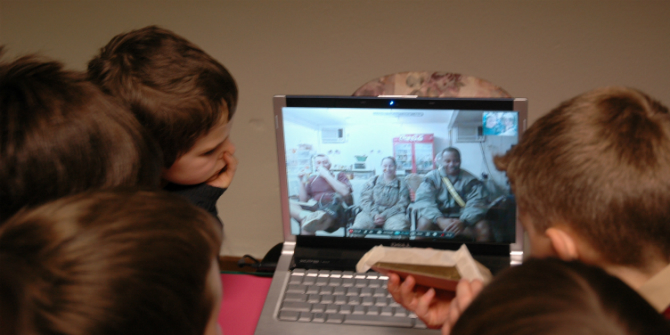 The holiday season is a time many people spend with family and loved ones. When soldiers, and men in particular, are deployed far from their families, how do they remain connected? Maj Hedegaard Heiselberg looks at how technology and the internet support family life from a distance. Maj is a PhD student at the Danish Veteran Centre and the Department of Anthropology, University of Copenhagen, Denmark. As an anthropologist, she is interested in issues around family relations, parenting and gender. [Header image credit: H. Post, CC BY-NC 2.0]
The holiday season is a time many people spend with family and loved ones. When soldiers, and men in particular, are deployed far from their families, how do they remain connected? Maj Hedegaard Heiselberg looks at how technology and the internet support family life from a distance. Maj is a PhD student at the Danish Veteran Centre and the Department of Anthropology, University of Copenhagen, Denmark. As an anthropologist, she is interested in issues around family relations, parenting and gender. [Header image credit: H. Post, CC BY-NC 2.0]
Many of the men deployed by the Danish Defence Forces on international missions are also husbands and fathers. In stumbling across the topic of Danish warfare, however, we rarely encounter stories about the challenges experienced by soldiers as they simultaneously balance the act of soldiering and parenting. This might be because ‘the soldier’ is often portrayed as a hyper-masculine character whose purpose is to fight for the common good. But is this the most accurate picture of a (Danish) soldier these days?
Father, husband, soldier
In 2015/16, I conducted a one-year ethnographic study in Denmark among male soldiers and their female partners and children. My findings suggest a somewhat different image of Danish soldiers, formed through the myriad ways in which they are not only soldiers, but also fathers and husbands, as they try to stay in touch with their families’ everyday lives during deployment.
Staying in touch
Technological developments and more stable internet connections have recently made it much easier for soldiers on deployment to communicate with family members at home, who can now often be reached within seconds via the likes of Skype, Facetime or iMessage. According to one father:
Three minutes every day is better than half an hour every half week, because then you get the little things…. It is the small, unimportant things that in some way become the everyday life, that become the nerve in it. You get a better idea what’s going on both ways, right?
Military institutions and support networks worldwide urge families to communicate during deployment, and there are now several online guidelines on how to stay in touch, such as Military One Source. As other studies on digital communication have likewise pointed out, these technologies provide family members with the possibility of taking part in everyday life at home. By reading bedtime stories or doing homework over Skype, or by sharing pictures of everyday activities via iMessage, the families manage to preserve a sense of connection and intimacy. The feeling of staying in touch with one another was of utmost importance for both the soldiers and their partners as it allowed them to come closer to what they considered to be a normal and ideal family life, one in which both parents are ‘home’, emotionally as well as physically present.
A balancing act
Aside from being able to experience and take part in the ‘small unimportant things’ in everyday life, parenting is also about managing the practical chores and activities of everyday family life, such as making lunch boxes and driving children to football practice. These routines are more difficult to be part of for soldiers who are thousands of miles away. Some fathers find it difficult to let go of the day-to-day tasks of parenting when social media and online communication services provide them with the information and possibilities to ‘parent’ from a distance, which is not always well received by their partners, as one solider, Jeppe,* describes:
I could be online almost all the time down there, so I got all the emails about [our daughter’s] handball practice on my phone, and in a way I controlled her [my wife]; ‘Do you have everything under control?’… And then she would be like, ‘You really don’t have to do that. I am the one at home, I am the one doing everything, so just let me coordinate and then you just have to be the one away for now’… I had so much time off, that I actually interfered and disturbed more than I helped because of my interest in my family.
Being available for daily updates on family life and general discussions about family matters is crucial for most families where a parent is physically absent for long periods of time. Yet, as Jeppe’s statement illustrates, it is a balancing act between being interested and involved in family life, and interfering to such a degree that the autonomy and abilities of the remaining parent are questioned.
New technologies – new dilemmas
To some extent, access to digital communication has made it easier for the absent parent to take part in everyday family life at home, although new dilemmas present themselves. The partners at home have often sacrificed a lot of time and energy that would normally be spent on building careers for themselves, socialising with friends or pursuing personal interests. Some of the women were therefore particularly sensitive towards comments and actions that might insinuate that their efforts were not appreciated or ‘good enough’, as in the case of Jeppe and his partner.
For others, such as Trine, the daily communication with her husband during his deployment was also a reminder of his physical absence and his inability to relieve her of some of the practical burdens of parenthood:
He [my husband] definitely became more part of our everyday lives even though he wasn’t there. But he wasn’t really any help, now, was he?
Trine was generally positive about the possibilities of online communication, but was also very aware of its limitations. Despite her husband’s online presence, the practical chores of everyday life were still hers to deal with, and neither Skype nor iMessage could change that.
Although families in which one parent is a serving soldier face particular challenges due to the risks and specific circumstances associated with military deployment, the questions raised here speak to a wider audience. How are time-consuming jobs that keep parents away from home for longer periods of time compatible with an equally shared responsibility of parenting? How do parents negotiate the roles of parenthood when ‘presence’ and ‘absence’ become relative terms? Military families are just one place to look for answers to such questions that I believe to be relevant for many parents who are practising parenting from a distance.
Notes
* All names have been changed to protect the identity of individuals.






